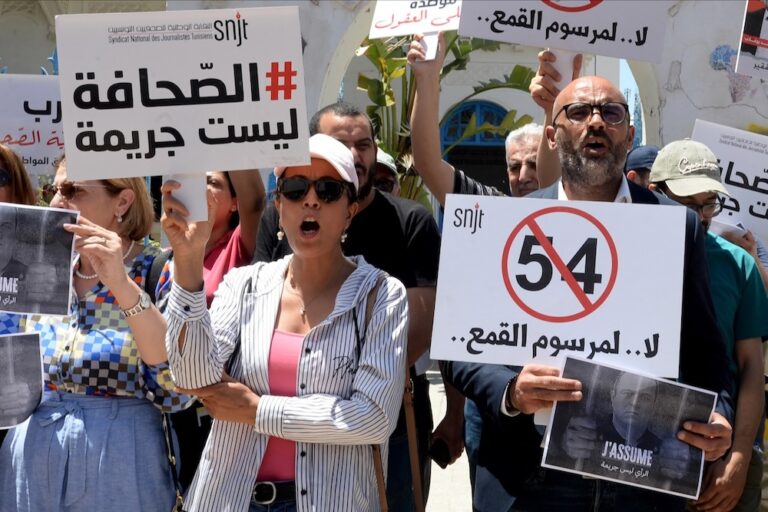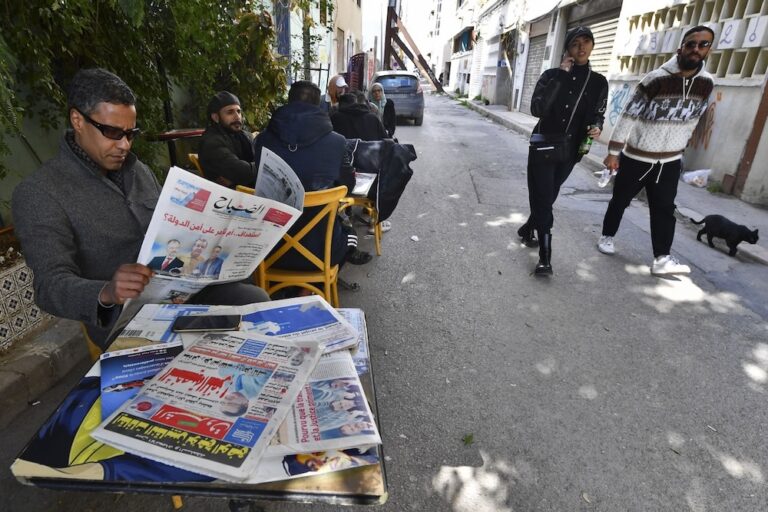(RSF/IFEX) – On 6 April 2004, a Tunis court sentenced eight Internet users from the southern city of Zarzis to up to 26 years in prison. The convicted Internet users were accused of promoting terrorist attacks on the sole basis of files they downloaded from the Internet. RSF voiced shock and outrage over the sentences […]
(RSF/IFEX) – On 6 April 2004, a Tunis court sentenced eight Internet users from the southern city of Zarzis to up to 26 years in prison. The convicted Internet users were accused of promoting terrorist attacks on the sole basis of files they downloaded from the Internet.
RSF voiced shock and outrage over the sentences and called for the Internet users’ release when their appeal is heard. “The trial of these young people demonstrates the Tunisian judicial system’s outrageous contempt for the rights of the defence. Simply consulting Internet sites cannot be considered evidence of a terrorist plot. The Tunisian regime is trying to terrorise Internet users and silence dissent,” the organisation said.
RSF called on the international community, and especially the United States and the European Union, to reaffirm that the fight against terrorism cannot justify violations of individual freedoms or allowing justice to take a back seat to the arbitrary exercise of power under any circumstances.
The Tunis Criminal Court, presided by Judge Adel Jeridi, sentenced seven persons to 19 years and three months in prison. They included Hamza Mahrouk, aged 21, Amor Farouk Chelandi, aged 21, Amor Rached, aged 21, Abdel-Ghaffar Guiza, aged 21, Aymen Mecharek, aged 22, Ridha Hadj Brahim, a 38-year-old teacher, and Ayoub Sfaxi, who lives abroad. Tahar Guemir, aged 19, who also lives abroad, was accused of being the ringleader and sentenced to 26 years in prison. Another defendant, 19-year-old Abderrazak Bourguiba, is to be tried shortly by a juvenile court because he was only 17 at the time of the alleged offences. RSF called for Bourguiba’s immediate release.
The Internet users were convicted of “creating a gang to terrorise people”, “violence against individuals with the intent to terrorise”, “holding unauthorised meetings”, “theft and attempted theft”, “preparing explosive materials” and “unauthorised possession of substances intended for making explosive devices”.
RSF has learned that the prosecution produced no credible evidence against the defendants. The case file only contained a few files that they downloaded from the Internet, such as information about Kalashnikov rifles and documents explaining how to make a bomb. At the time of the arrests, the police only confiscated a tube of glue and a few CD-ROMs, which were the only evidence to support the allegation of “making explosives”.
One of the defence lawyers, Najib Hosni, said many irregularities marred the judicial proceedings. For example, since the defendants were arrested in Zarzis, they should have been tried in the city rather than Tunis. In addition, five of the defendants filed complaints alleging torture, but the court refused to allow medical examinations.
According to several sources, the defendants simply used the Internet to download files about the situation in the Middle East. They also reportedly held discussions with their teacher, Hadj Brahim, about ways to support the Palestinian cause.


